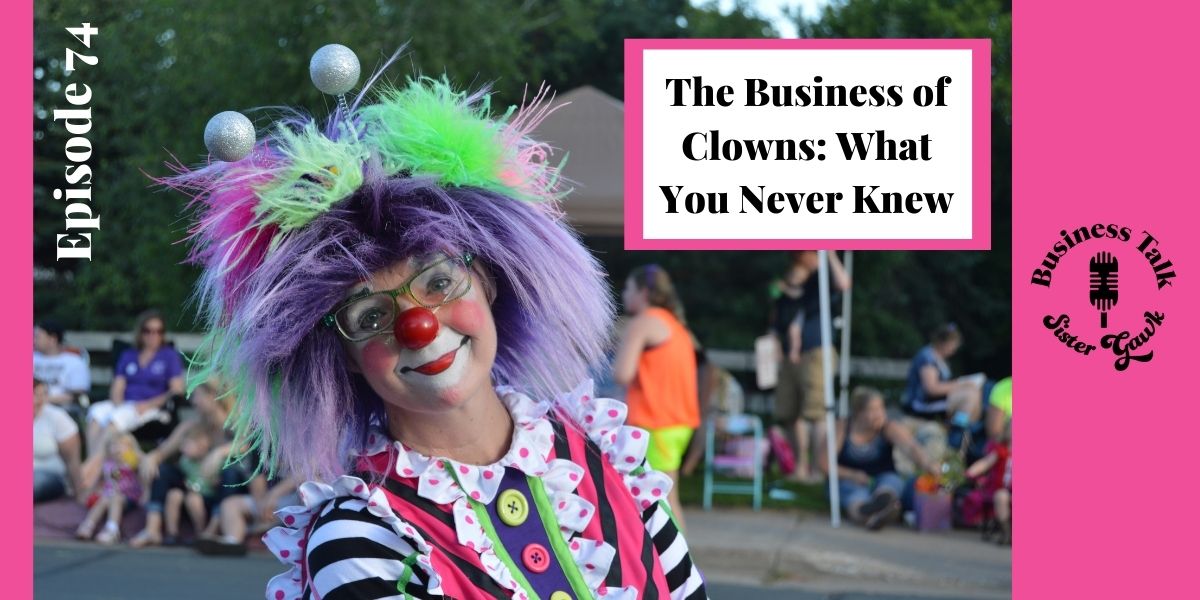This week, we interview a world renown clown about her business of costume making and educating clowns across the world. Even if you’ve never considered getting into the entertainment business, this is going to be an interesting listen to hear all about the world of clowning! Take a listen, and you’ll be glad you did!
Welcome to Business Talk Sister Gawk! I’m Bekkah! And I’m Ruthie and today’s episode title is “The Business of Clowns: What You Never Knew” and with us today we have an entrepreneur, a costume expert, and a clown: Tricia Manuel! She’s a clown! Her name is Priscilla Moosburger! Thank you so much for being with us today.
Tricia: Thank you!
Bekkah: Ah! We are so excited to have you!
Ruthie: Just getting to meet you was the craziest thing! We were picking up on some of our product down in the cities and we stopped – Well, what’s considered “the cities” to us which is basically anything that is south of like Saint Cloud, but anyway so we just got to go into your store and meet you and it was just so fun getting to know you! So we just had to have you on our show! Thanks for being with us!
Tricia: I’m very happy to be here!
What Do You Do as A Professional Clown?
Bekkah: Yeah, so the first question is what do you do?
Tricia: I am a professional clown and I started my clowning pretty much with Ringling Brothers Barton Bailey Circus. Then after I finished my tours, I did three tours on the road with the circus, I started to look around and go, “How do I make a living?” I could sew and so I started making costumes for other clowns that I knew. That grew into a business that I’ve had since 1989 where I manufacture professional clowns, quality costumes for clowns all over the world!
Mostly in the United States and Canada, but yeah. We’ve been doing this for what seems like forever and it’s been a lot of fun. It’s taken me overseas and all over the country and I’ve gotten to know some really amazing people and lived in the clown community for pretty much the last 40 years.
How I Got Started in The Clown Business
Ruthie: That’s awesome. That’s so cool! Okay, so what is your why? How did you – what got you into all this?
Tricia: Well, the first time I got to clown was for a hometown parade and I can honestly say it was a religious experience. The “why” is great because I said, “I don’t know why, but I know I’m going to do this for the rest of my life.” I don’t know how because I didn’t know anything about professional clowning but the journey just kind of unfolded itself. I was led to getting accepted into Ringling’s clown college in 1982. Then was offered a contract with the Greatest Show on Earth and it just things just kind of unfolded.
Then I started looking around. I got hired to do clown arts education and a little bit after, about seven years after, I was teaching at a different clown school in the summer time I said, “You know what?” The people around me said, “You need to have your own school!” and helped me create Mooseburger Clown Arts Camp and for 26 years I ran Mooseburger Clown Arts Camp until Covid but we’ll be coming back with it again next summer! This past summer we went, “Well, we better pivot and do a virtual program called ‘The Joyful Journey’.” You can’t just stop the “why” is because you just can’t think of doing anything else.
How to Do a Clowning Business
Bekkah: Yeah! My question then is how do you do it? I know that’s pretty broad so if you need me to narrow it down, I can.
Tricia: Well, the “how” was you don’t have any other marketable skills. So you have to make it work and that was pretty much my story. I had finished clowning on the circus and you know there’s not a lot of ads in the paper for “used circus clowns”. It’s a pretty narrow window of skill. I got the opportunity to clown at Disneyland and met a lot of really great people who said, “Hey, you know if you move out here we can get you jobs as a clown.” You know this was in the late 80s and I did that.
I was able to work as a clown doing company picnics and parties on the weekends and then sew costumes during the week. Finally, I realized I needed to be back in Minnesota where I’m from because all the clown conventions where I was selling my products were on the East Coast. Most of the clown clubs and their conventions, because clowns have conventions just like everybody else who has a hobby or business. We have conventions. There’s the World Clown Association has its national conventions and regional conventions and the Clowns of America International has a big organization as well.
It was like, well, I moved back to Minnesota back to my hometown Maple Lake and just went to conventions! When clowning was at its – I would say at its peak was in the 70s and the 80s when it was the most popular, before the scary clown stuff kind of collapsed our market. Every kid in a metro area had a clown at their birthday party. The clowns had lucrative businesses doing parties. Doing magic shows and balloons and face painting and it was a great money maker. I sold lots of expensive cost es to clowns who had big business on the weekends doing parties!
Where to Start When Becoming a Clown
Ruthie: Okay, so if you are someone who is fascinated by clowns what should be your first step in kind of pursuing a clowning career?
Tricia: Well, there are a lot! Now with the internet, there are so many great things online! You can call me because I’m mentoring clowns all the time!
Ruthie: Yeah!
Tricia: We have so many great options at mooseburger.com to help mentor new clowns. You have to have a friend in the business because if you – I mean see if there are any local clowns in your area who want to mentor you. It’s really easy to spend way too much money on makeup and costuming and props and stuff. People are just dying to sell you stuff. It’s really important to have a mentor to kind of walk you through different ways to do your performance.
What kind of clown do you want to be? Do you want to do parades and you know have you seen a clown? What drives you? Some clowns do just volunteer clowning at hospitals and nursing homes. Though, that market has kind of dried up for now, but it’s opening back up again. What do you want to specialize in? Do you want to do puppet shows or magic shows or you know what, it’s so broad! It’s like saying, “Well, I want to be an artist.” Okay, what kind of artist? You know, clowning is broad like that.
Ruthie: You said that you kind of have to know somebody in the business.
Tricia: Well, it’s helpful!
How to Get Connect in The Clown Business
Ruthie: How did you find someone in the business? You said you started out in like a parade and then how did you find someone?
Tricia: Well, I didn’t. Which was kind of crazy, but, honestly, I was an intern at the Children’s Theatre company in Minneapolis and I bumped into this woman at the copy machine. I mean I was an office intern and she had on a t-shirt that said “Clown Alley” on it and I went, “‘Clown Alley’! What’s that? What’s a ‘Clown Alley’” and she just laughed at me and said, because basically I didn’t know anything.
Well, Clown Alley is the term for a clown club because the clowns were in the alleys between the two circus tents. The clown’s dressing area was always right next to the back entrance because if anything went wrong on the circus the clowns have to go in and distract the people from any kind of disaster that might have happened. She told me all about Clowns of America International and gave me one of their magazines. That’s where I saw the advertisement for Ringling Brothers Clown College had its application.
That’s how it unfolded for me, but now with the internet, there’s just so much more! We’re talking 1982 and there weren’t even computers for popular use! I think it’s good to find a mentor because the glut of information is out there. If you Google clown you’re more than likely going to get a scary clown image. You’re not going to get my people who are wonderful and generous and kind, happy, loving people who just live to make people smile. You have to be a little bit careful when you’re looking for that. Go to mooseburger.com. *All laugh* We’ll help you.
Are Clowns and Comedians Different Businesses or Similar?
Bekkah: I have a question about what are the key differences in being a comedian versus a clown or are they very similar?
Tricia: Well, that’s a really good question, because a lot of times comedians get called clowns. But so do politicians and that has nothing to do with it. It’s very insulting to us when they use our name in vain, but a comedian wants to make people laugh and wants to make people laugh at them. They will use themselves to make them laugh. The clown is a little bit different because they create a persona. Your clown character is like your alter ego and I think maybe for comedians, like Don Rickles.
He was – any of you guys probably don’t remember him, but he had this sarcastic cutting wit but in reality, he was one of the nicest people that you’d ever want to meet. He was a very genuine kind person, but his stage persona was very sarcastic, hilariously so. Clowns have a persona and what happens is when we become our clown it’s not like a character in a play where you’re acting, it’s your own personality that is set free from all the restraints and baggage that you carry around as an adult.
You feel free when you have your clown makeup on and you’re your happiest, positive, silly, crazy self because the makeup and the costume just do that for you. There’s a difference that way. We have makeup and costume to help us be funny and help us express ourselves where a comedian maybe has physical comedy but more verbal comedy.
How Making People Laugh in Different Cultures Varies for Clowns
Ruthie: That is so interesting! I love the way – I was thinking the whole time, “I like where she’s going with this. This is really interesting.” Okay, so are there any cultural differences or like subsets of clowns that vary by region. You said you’ve been all over the place with this. What are kind of –
Tricia: Oh, yeah! Well, every culture and society has clowns going back through time but yeah very much so! Very different the comedy in Japan is different than the comedy in Africa, than the comedy in America, than the comedy in England! There are all different kinds of cultural norms that it’s just different! It’s what people think is funny and it’s usually a real shock for Americans when they go to clown in Asia because the Asian audience is so polite they just sit there and stare at you. They may be laughing on the inside.
Even in the United States when I was with the circus there was a huge difference in audiences down in Georgia versus Utah! Utah they just sat there and did the golf clap at mean. And in Georgia! My gosh! They tear down the roof! They just – it was unreal the differences in different parts of the country! And that just again has to do with culture.
How to Gather Feedback on Your Clown Routines
Bekkah: Yeah how do you gather, how do you get feedback on your routines that you’re working on?
Tricia: Well, you listen. If they don’t laugh, a famous clown said, “If they don’t laugh, it’s not funny!” You just have to watch your audience and read it! They’ll come up to you afterward and tell you whether they liked it or not. Or get up in the middle of your act and walk out. If you’re at a festival that’s really heartbreaking, but most clowns there’s not like that third wall.
You directly interact with your audience. You’ll find out. You’ll know because you’re talking to them. You’re doing stuff for them. You don’t ignore them you have to have a relationship with your audience to do comedy, to do live comedy. There’s a relationship there. You have to go out on stage and make friends with your audience otherwise you’re sunk.
How to Overcome The Anxiety of Getting in Front of People
Ruthie: Okay, when you first started out how did you overcome the anxiety of getting in front of people and doing your act and stuff? You kind of mentioned earlier you become this character, this alter ego but how did you tie in like overcoming an insecurity of just getting out there and being yourself?
Tricia: That’s a good question because your sheer desire to do it overcomes your fear and all good performers have butterflies and are afraid. I’d say most of us have anxiety over our performances. Whether we’re going to be any good or whether we’re going to make people laugh. Throughout my career I have suffered with some severe anxiety about whether I was good enough. You’re only as good as your last performance and “well, what if they don’t laugh?”
I had a business coach and I had to write new material and I had really hit a a spot where I was suffering because I couldn’t – I was struggling with writing new material and she said, she who’s not a clown at all said to me, “Well, what are you afraid of?” I said, “Well, what if I’m not funny?” And she just said, “Well, have you ever not been funny?” and I said, “Well, no.” She said, “Well, then what are you afraid of?” “But what if I’m not funny this time?” and she just laughed at me. Like, “Oh.” She goes, “You know how ridiculous that sounds?” I’m like, “Yeah, I guess it is kind of dumb. I just need to do it.”
Your sheer desire to get out there because applause and laughter is like food. You have to have it. It’s like oxygen. You’ll do it even though you’re afraid because you need that food and that oxygen and that self. You need to be affirmed. You know, it’s a crazy thing! We’re very needy people, but in a good way!
How to Evaluate Clowning Opportunities
Bekkah: I was gonna ask a logistical question as you’re running a business and stuff how do you know this is going to be a good opportunity versus another one?
Tricia: I think you have to go with your gut and be a risk-taker. I think that’s what slows down people. That’s my question when I talking to people who want to be entrepreneurs and start their own businesses. I have. I honestly say, “What is your risk tolerance level?” You have to have a high tolerance level for risk, because you don’t know. You could just weigh all the facts and make a good guess, but you really don’t know.
You have to go off of your experience or the experience of others, but I know people who just have to work for somebody else, because their tolerance for risk is just so low. They just can’t bear the thought of risking anything so they’ll stay in a job that they hate because they know that paycheck’s going to be there every week. Where entrepreneurs are like, “Well, how do you know it’s going to work?” “I don’t know, but I got to try! I just can’t help myself!” I’ve stayed in this business for all these years not because I was getting rich, but it was just because of the personal satisfaction in the people I’ve met, and then the things I’ve been able to do are worth more than the paycheck.
I don’t know if you’ve ever had this experience but when somebody says to you, “You saved my life.” Well, then what do you do after that? “Coming to Mooseburger Camp saved my life. You teaching me how to clown saved my life.” You go, “Uh!” Usually what happens are the days when you have your head on your desk and you’re going, “I think I need to quit. I need to get a real job.” and then somebody calls you up and tells you that and you’re like, “Okay, now where do I go with that? I guess I have to keep going.”
What Props and Tools Should Every Clown Have?
Bekkah: What are essential props or tools that you think every person who wants to get into clowning should have?
Tricia: Well, personally I love my rubber chicken that I’ve attached to my ukulele, but –
Bekkah: That is true!
Tricia: Because of my art form my Chick-a-leigh-lee! Because it’s an art form. I mean I know clowns who are magicians and they could never leave without a thumb tip or you know certain magic props and balloon artists. You know clowns to do balloons have to have their balloons and face painters and you know puppeteers! I don’t know if there’s – I think we all need a red nose that pretty much identifies us as clowns.
Bekkah: Yeah and I’m just gonna comment for those of you who are listening when we first met Tricia one of the very first things she did was she walked in or walked back to her office and grabbed her Chick-a-leigh-lee and played it for us!
Ruthie: It was my birthday! And she’s saying me “Happy Birthday” and it was delightful! It’s so cool.
Bekkah: Yeah and we’ll share that, We took a video so we’ll show that.
Tricia: Oh did you!? *laughs*
Bekkah: Oh yeah we did!
Tricia: I didn’t even know that! Oh my gosh, you’re so sneaky!
Resources for Starting a Clown Business
Bekkah: Okay so what kind of other resources if someone were like, “Hey, I want to know more about this or like try it out,” where would you recommend they start just getting some information and getting prepared?
Tricia: Well, I’d say go to mooseburger.com and check out the E-Alley or The Joyful Journey. Call me, email me, I’m mentoring a young girl right now at in Illinois who originally was afraid of clowns. She thought learning more about clowns would help her get over her fear and I gave her free access to our clown online clown meetings on the E-Alley and she could not get over how kind and wonderful everybody was. She was just blown away by the clown community who just couldn’t wait to help her and encourage her.
I think for somebody if you just are getting started I mean I can get you connected to the clown community wherever you’re at. If I know where you’re at I know clowns all over the United States. At every state of the union. I’d be more than happy to help connect you with other great clowns in your area. I have a non-profit organization I started called Red Nose Readers and there are over a hundred red-nosed readers across the country, before Covid.
But they’re still doing it now, reading stories, and getting kids excited about literacy and anti-bullying message. Because clowns get bullied and that’s a crazy thing, but we’re like the poster child for people who’ve been bullied. Most of us had horrible childhoods or were bullied as kids and we’re drawn to clowning because if you can make people laugh they usually aren’t trying to hurt you.
Ruthie: You are just the coolest person ever. You’ve got like all these different things that you’ve started and you’ve touched so many people’s lives and I’m just so happy that we’ve met you! Like it’s just so cool!
Bekkah: Yeah, well, and I even think back, I remember when I was in high school we used to do this fundraiser that the city I lived in would ask our youth to be clowns for the parade. That was the first time I’d ever done that and I haven’t done a ton of it in my life but I remember one year I decided I was gonna like be the best clown I could possibly be.
Tricia: Yay.
Bekkah: And I like got really into it and I was literally like, “Wow! This is actually so freeing!” because I figured out for it I was like, “I’m not gonna speak. I’m just gonna be like a mime clown.” And I would make people get up and dance with me and all this stuff and they were so embarrassed and it was the best thing in the world!
Tricia: Isn’t it awesome? It’s like a drug!
Bekkah: I am right there with you! Like, wow! This is actually like when you do it and you’re in character, all of a sudden, you feel like you can just do all these weird things and everyone’s like, “It’s fine. They’re just the clown. They can do that!”
Tricia: You’re a superhero!
If you enjoyed this episode as much as we did, you’re going to want to share it with a friend on Spotify it’s #74!




